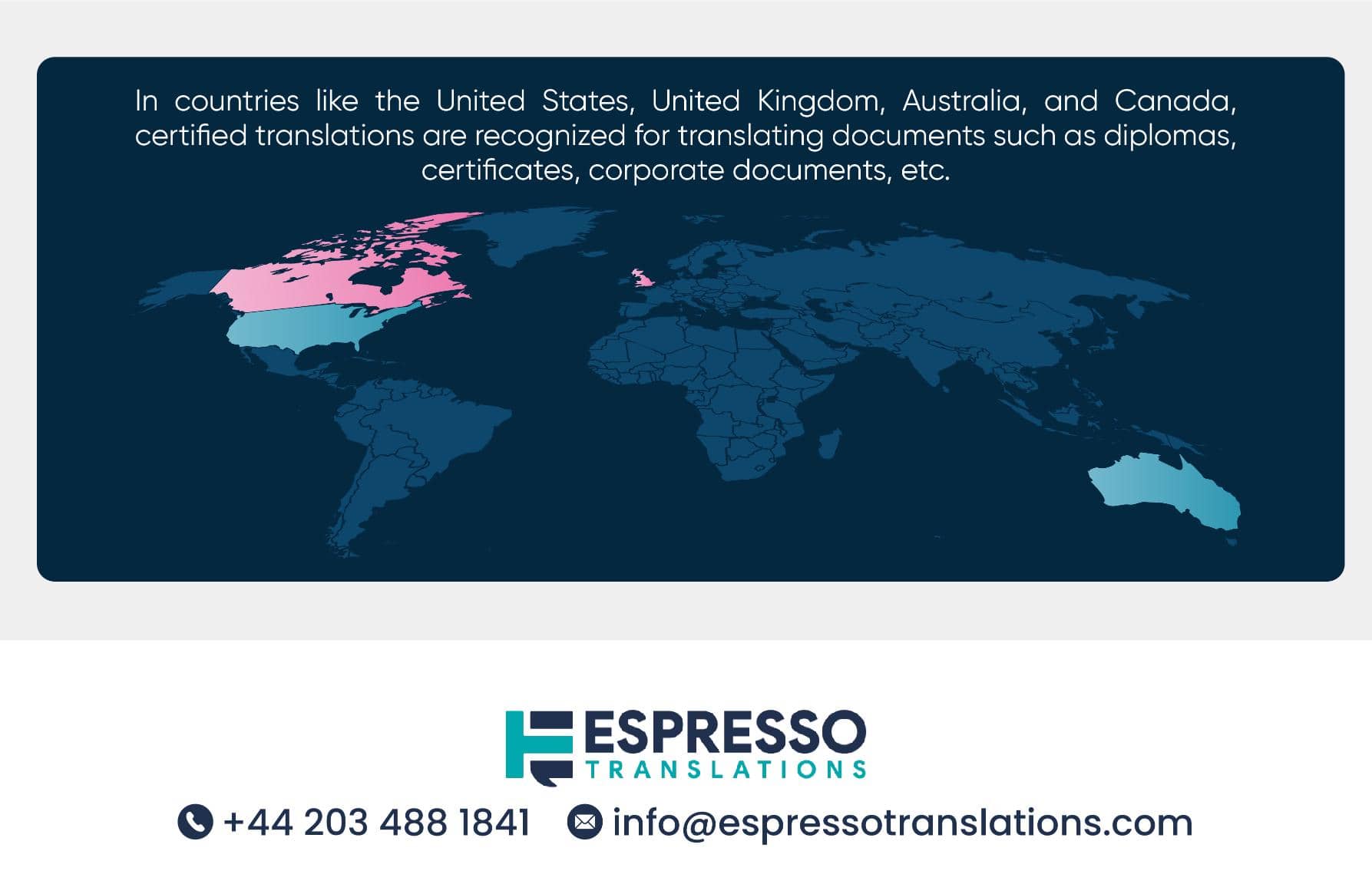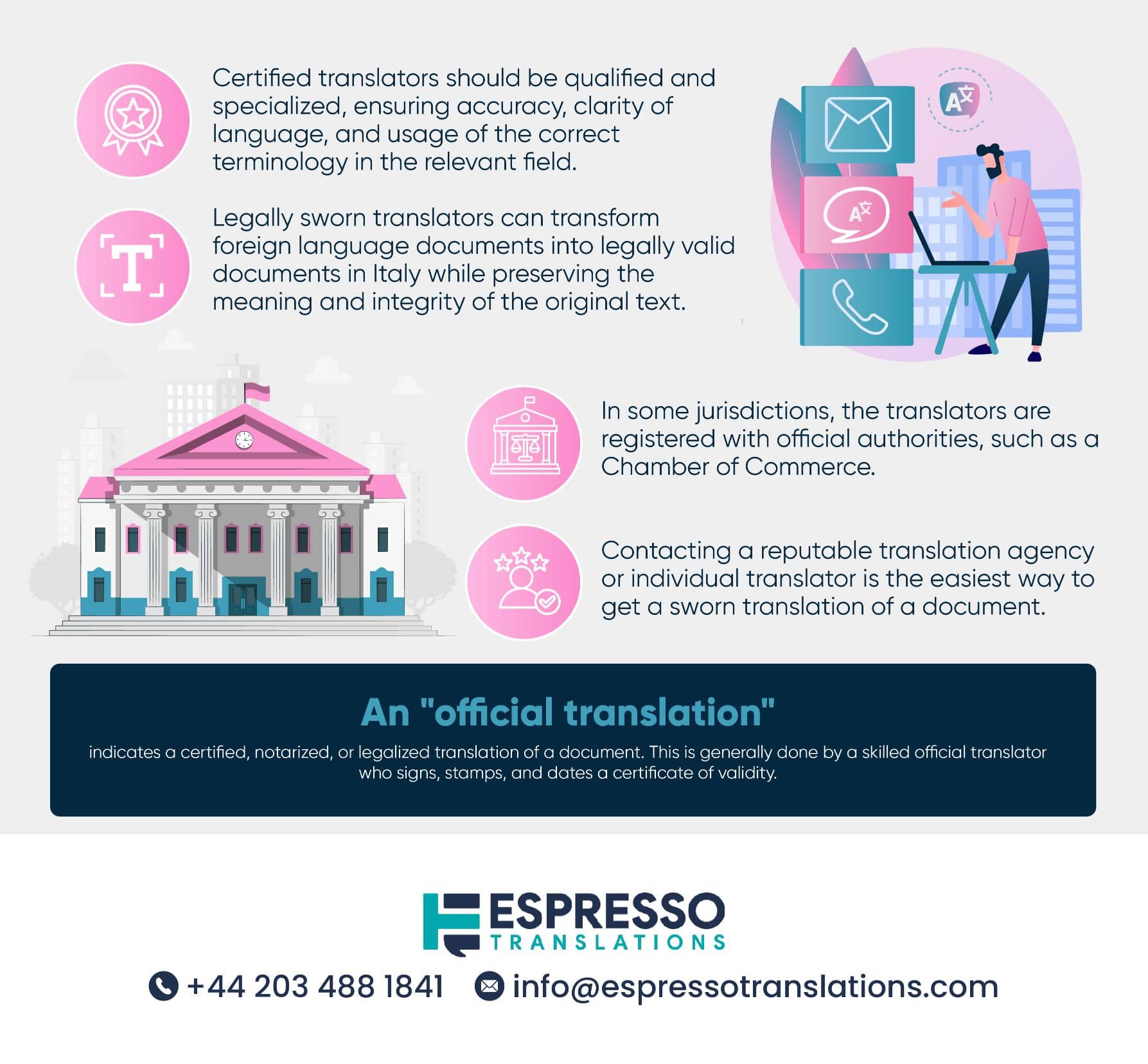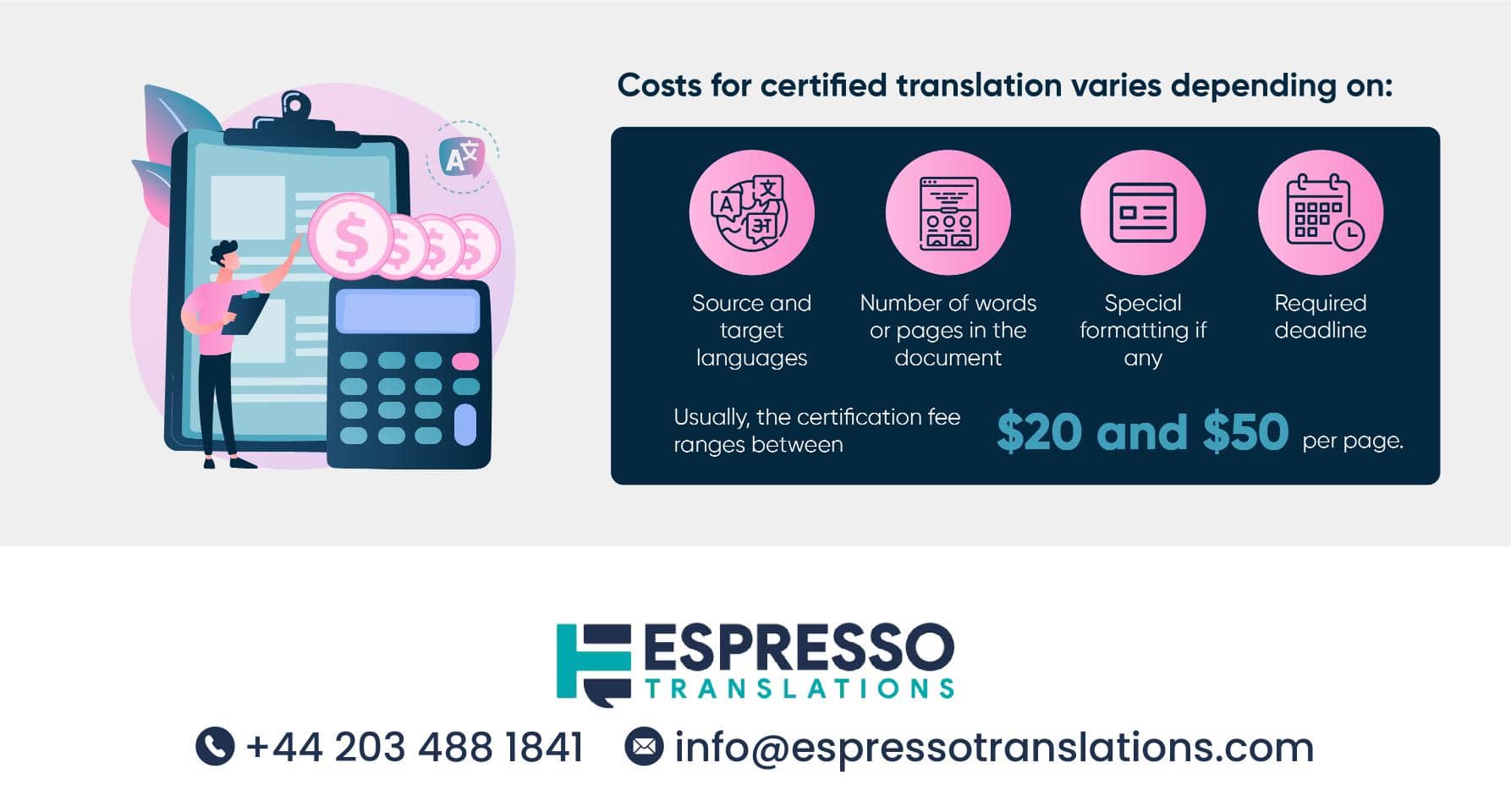Official document translation
Most government authorities require that translated documents submitted for legal or official purposes be furnished with an assurance that the translation is a complete and faithful representation of the original document, and that the translator takes responsibility for its accuracy. An official translation comes with a statement that meets this requirement.
The statement of truth that accompanies an official document translation is a certification from the translator, printed on company letterhead, that the translation was professionally produced by a translator or translation team that stands behind the translation.
The exact requirements for an official translation are different in different countries. The United States Citizenship and Immigration Services (USCIS), for example, only accepts certified translations. European countries like France, Italy, and Spain may require a sworn translation by a certified linguist.
Official translations are commonly required for:
- Personal documents: passports, birth or marriage certificates, divorce documentation, death certificates, and academic certificates
- Business documents: court papers, medical device instructions, and legal contracts
Translations of documents for personal use do not need to have any kind of certification. Even for such informal uses, be skeptical of using online translation tools, because they still may produce awkwardly worded or inaccurate text.
For official uses, however, you should seek a certified professional translator or translation agency with lots of experience in translating documents for official purposes. The legal validity of a translation can be crucial in some instances.
Espresso Translations is a reliable agency with an extensive history in providing skilled translation services for official and legal documents. We offer certified, sworn, legalized, and notarized translation. In addition, our helpful customer service team can help you understand exactly which level of certification meets your needs.

What is an official translation certificate in the USA?
Usually, official translation documents carry a stamp and/or a statement by the sworn translator.
This stamp or statement will help authorities recognize the validity of the document. It will also allow them to ensure that the document has been translated by a professional translator.
In the United States of America, a common type of official translation is the certified translation. We recommend you employ a qualified translator or certified translation agency for certified translations to be used for official purposes in the US.
Espresso Translations is an ISO-certified translation provider with a team of more than 1,500 professional linguists providing precise, dependable translations that can be accepted by public institutions in the United States. Our translators have a minimum of 5 years of professional experience and/or possess translation credentials. If you need a translation, get a free quote today.
When do you need an official translation?
There are several reasons why an official translation would be used.
One example would be when switching from an English to a Spanish school or university. In this case, any official documents would have to be translated by a sworn translator.
Some schools or universities may not accept documents without them being officially translated by a sworn professional translator.
An official translation is also often used for Immigration & Checkpoints Authority (ICA) Translation. This is used for travel and immigration purposes.
Documents used for these purposes are extremely valuable, some examples would include:
- Work clearance
- Court documents
- Police clearance
- Driving licenses
All of these documents have to be translated by a sworn professional translator.
How to officially translate a document?
Whether you are in the US or anywhere else on the globe, start by contacting a certified translation agency like Espresso with a reputation for providing official translations and taking pride in their quality of work.
Here are some important tips for identifying a professional and reliable translator:
- Look for someone with expertise in the source and target languages involved.
- Read reviews from past clients, with an eye out for five-star reviews for quality translations.
- Check whether the translator is ISO certified (17100:2015) for quality assurance or a member of a translation association such as the American Translators Association (ATA) or the Institute of Linguists.
- Find out if free revisions after delivery are a possibility in case changes are needed.
- Ask for a quote on your documents, specifying your official translation needs.
- Make sure that the translator or association has a privacy policy to preserve the confidentiality of your documents.
- Ask about possible additional costs that could be added to the quote you receive. Taxes, stamp duties, desktop publishing charges, and printing or postage fees should be included in the quote. Digital copies should always be free.
- Confirm that the translator’s turnaround time works with your deadline for submitting the translated documents.
- Ask what type of official translation services and certifications can be provided.
What are certified translation services?
A certified translation comes with an attached statement (certificate of translation) in which the translator attests that the translation is a “true and accurate translation of the original document.” This statement includes the contact information and name of the translator, and the statement must be signed and stamped by the translator or translation company. A certified translation is more likely to be accepted by officials in the U.S. or other countries. The USCIS, for instance, will require a certified translation of any documents submitted.
What is a sworn translation?
A sworn translation is a certified translation done by an accredited or court-approved translator who swears an oath in front of a public official as to the accuracy and faithfulness of their translation. Common-law countries like Italy, France, and Spain usually demand sworn translations. Some countries may also charge the translator a fee or administrative duty charge in order to consider a sworn translation legally valid.
If you have a short deadline, keep in mind that a sworn translation normally takes more time than a certified translation, because the sworn translator needs to make an appointment with the local court to swear the oath.
Also Read: What is a sworn translation?
What is a notarized translation?
A notarized translation is a little different in that it does not necessarily ensure the translation is complete and accurate. Instead, the notarization simply is a verification of the translator’s identity and qualifications. A notary public will check the translator’s identification and credentials, then add their seal and signature to the certificate the translator provided. Documents submitted to government agencies seldom need to be notarized, although private businesses may require it.
What is a legalized translation?
A legalized translation must carry an apostille. An apostille is a certificate of authenticity for public documents. The apostille is added to a sworn translation and validates the signature of public official who witnesses the translator’s oath. Apostilles are often required for documents submitted in applications for foreign visas or immigration.
Legalized translations are commonly required for sworn translations in the more than 120 countries that are party to the Hague Apostille Convention.
The different types of official translations may be a little confusing, so you are welcome to ask questions of the project managers at Espresso Translations, who can help you determine what your particular case requires.
If you need an official translation, get an instant quote from Espresso Translations.

Where can I certify official documents?
Espresso Translations is a leading provider of translation services with a long history of certifying official and government documentation. Our ISO 17100 certification is a testament to our quality control processes. Our team of linguists consists of more than 1,500 expert native speakers with proven attention to detail. Espresso Translation can meet all your needs for the high quality translation of official documents that you can be sure will be accepted by authorities in the US and overseas.
Our fast translation process includes both translation and proofreading steps to ensure translation accuracy. We have many service and payment options to choose from, and we can provide expedited delivery by request, even 24 hour delivery!
Who can offer official document translation services in the US?
Espresso Translations serves many clients in the United States and around the world. Because the entire translation process can be completed online, we provide translation services wherever they are needed. No matter your location, just send us your documents and ask for a free quote using our online form. Be sure that you provide clearly legible scans or electronic copies of your documents and describe the type of service you need.
You can also start the process by emailing us your source document if that is more convenient. You can also telephone us: leave your name and ask for a call back. Regardless of how you reach out to us, we will respond quickly and offer helpful customer service with our professional translation services.
Official Translation vs Certified Translation: What’s The Difference?
You may have also come across the term certified translation which is similar to an official translation.
With a certified translation, the document also receives a stamp. However, it also comes with an additional certification letter.
A certified translation is often used by legal authorities in countries where sworn translations don’t exist, the UK for example.
Additionally, a certified translation will also include the details of the translation company, as well as their credentials and a statement of certification.
If you are not quite sure which type of translations you need, you can also ask us when using our service to advise you on your needs.
How much does an official translation cost in the USA?

For an official translation into English for use in the US, prices start at $30 plus tax/VAT. The total you will pay for an official translation will depend on the following factors:
- The type of service needed (certified, sworn, notarized, or legalized)
- The source language and the target language
- The country where the translation will be used
- The length of the document, often measured by the word (often $0.10 to $0.15 per word in the US) or sometimes by the page
- The complexity of the formatting
Some foreign governments may also charge taxes and duties.
Read more: How much does a certified translation cost?
How to become a certified translator?
If you aspire to a career as an official translator, the first requirement is native proficiency in the target language, meaning the language the document will be translated into. You should also be quite fluent in the source language either due to speaking a second language at home, experience living in another country, or earning a degree in one or more additional languages.
You should also consider the local requirements in the country where you wish to work as an official translator. The United States, for instance, has no specific requirements for this job. In Italy, however, a sworn translator must be listed on a professional register. Other countries have their own requirements.

